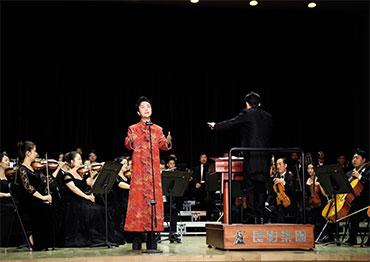Li joined the China National Opera & Dance Drama Theater in 2009. He currently has 14 albums and several singles under his belt.
Li has appeared on the most respected stages in China and abroad. In both 2012 and 2013, he performed on the CCTV Spring Festival Gala, the country’s most watched television program.
In 2009, he became the second Chinese artist to perform at the Sydney Opera House in Australia. Over the next decade, Li toured Europe, South Korea, Japan, Singapore, the US and Canada.
However, Li had bigger plans, and sought to create works that “leave their mark on the history of performance art.”
The result was Lady Zhaojun, a contemporary staging of the legend of Wang Zhaojun, a famous beauty from the Han Dynasty (206 BCE-220). She is revered for brokering peace by volunteering to marry the ruler of Xiongnu, or the Hun, a powerful nomadic group far to the north.
To better understand the heroine’s mindset, Li and the production team spent the summer of 2013 retracing her 3,000-kilometer journey north from her home in Zigui, Hubei Province to the Han capital of Chang’an (modern-day Xi’an), and then to Xiongnu territory (now Inner Mongolia Autonomous Region).
Li dedicated himself to the production for the next six years. He made over 100 revisions and oversaw everything from costumes and props to choreography, lighting and stage design.
TV variety shows boomed in China during the mid-2010s and became fast tracks for singers and actors looking to achieve breakout fame. However, Li was reluctant to participate.
“Many variety shows, including the most popular ones, did invite him, but the problem was that he refused them all,” music producer Ma Hua told NewsChina.
“No, I did appear on two or three,” Li corrected. “At the time, I was having serious financial issues while making Lady Zhaojun. I needed money to fund it.”
In 2014, he sold his only property in Beijing to pay for the production.
“A stage show, no matter how popular, is only performed for thousands. It’s generally thought that producing a stage show is far less effective than appearing on variety shows in terms of influence, popularity and revenue,” Ma said. “As friends, we all understood his choice and persistence. But sometimes we still feel that the road he has chosen is too lonely.”
“I am alone but not lonely,” Li responded.
Lady Zhaojun premiered at Beijing Tianqiao Performing Arts Center in April 2019. Audiences were overwhelmed by its gorgeous costumes, stunning stage effects, and particularly Li’s melodious voice and graceful acting. Apart from touring at home, the show was staged at the Thailand Cultural Centre in Bangkok, the San Diego Civic Theatre, and the Queen Elizabeth Theatre in Vancouver, Canada. After his Vancouver performance, Li received a congratulatory letter from Canadian Prime Minister Justin Trudeau.
Li’s next project is another musical focused on the story of Yang Guifei, the famous concubine of Tang Dynasty Emperor Xuanzong. Instead of centering on the famous romance between Yang Guifei and Xuanzong, Li’s new production will revolve around the creation of the “Dance of Rainbow and Feather Clothes,” an imperial dance composed by the emperor and performed by Yang Guifei. He hopes the production gives audiences some new insight into Yang Guifei and Xuanzong, not just as an imperial couple, but as two artists.
He hopes to explore his ideas on philosophy and art in the work. “More than anything, the moment I step on the stage is when I can feel truly happy and be myself,” Li said.

 Old Version
Old Version
